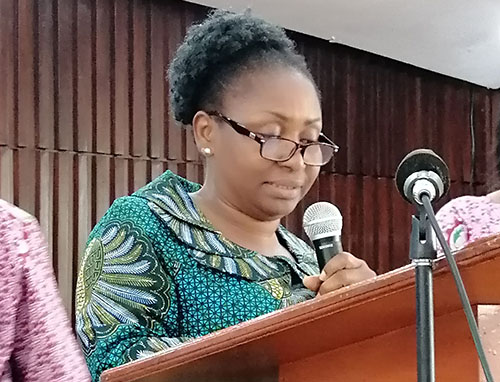Dr Renee Aku Sitsofe Morhe
A SENIOR law lecturer at the Kwame Nkrumah University of Science and Technology (KNUST), Dr. (Mrs) Renee Aku Sitsofe Morhe, says perspective of women is needed for the country to achieve the universal educational goals set out by the United Nations.
According to her, greater strides by government towards achieving inclusive and equitable education may be impossible if women’s perspective is ignored in the scheme of things.
Addressing the 7th quadrennial delegates’ conference of the Teachers and Educational Workers’ Union (TEWU) Women’s Committee in Kumasi, Dr Renee said the perspective of women in every endeavour is important for success.
“The Government of Ghana, like all other governments in the world, is tasked to achieve and realize the Sustainable Development Goal 4 – Ensure inclusive and equitable education and promoting lifelong learning opportunities for all.”
She argued that quality education is one that provides not only free access to primary, secondary and tertiary education, but also equitable access, which includes introduction of policies that seek to re-right wrongs that limit access to certain classes of people.
She was delivering the keynote address at the conference held on the theme: “60 Years of TEWU’s Contributions to the Development of Equitable, Inclusive and Quality Education Delivery in Ghana.”
For the law lecturer, education is also equitable when it addresses the socio-economic imbalances in access to education by ensuring that people from diverse backgrounds have more or similar opportunities when it comes to introduction, accessing and using new technologies for example.
“Sustainable Development Goal 4 therefore calls for equal access for all women and men to affordable and quality technical, vocational and tertiary education,” she noted.
She added that the goal also demands for the elimination of wealth parity and education on human rights, gender equality and promotion of a lifestyle that foster cultural diversity and peace, and is free from violence.
National President of TEWU Women’s Committee, Johanna Hammond, on her part, said government intend to emphasize on curriculum, motivation of teaching staff, accessibility and infrastructure as solutions to quality teaching and learning, and forget about the important role of non-teaching staff.
She asserted that women in the non-teaching staff category, who play dual responsibilities as mothers and workers, are normally forgotten in many considerations.
She entreated government and heads of institutions to have positive mind-set towards the non-teaching staff since they form an integral part of the educational system.
From Ernest Kofi Adu, Kumasi


